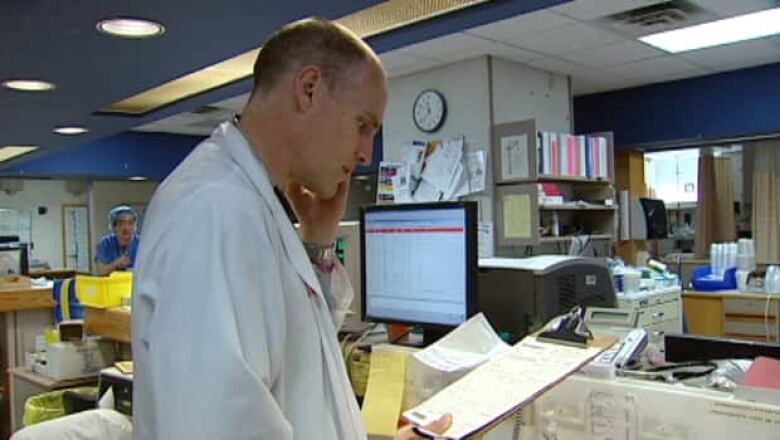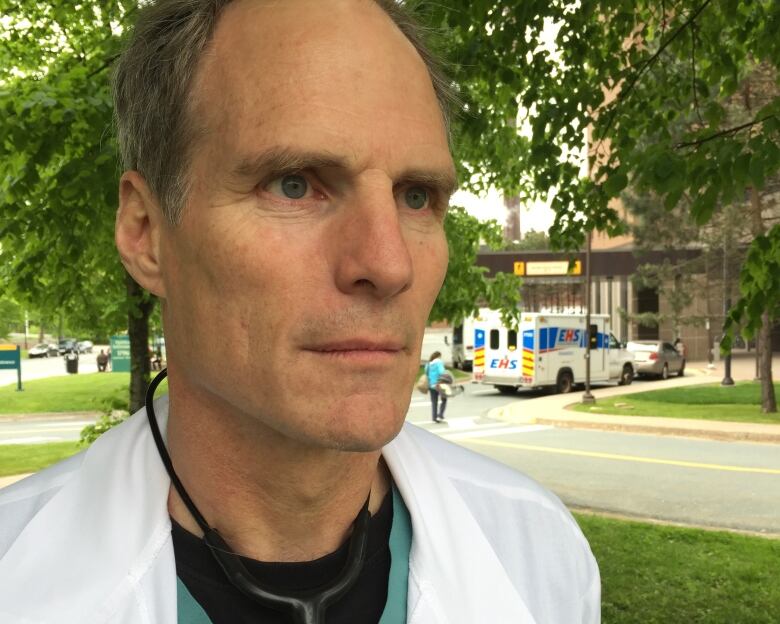Why long-term care patients don't belong in the short-term ER
'We have to advocate for the people for whom the space is intended,' writes Dr. Samuel Campbell

CBC News asked Dr. Samuel Campbell, the chief of the emergency department at the Halifax Infirmary, to write an editorial regarding the increasing numberof long-term care patients coming to the ER.
When I was asked to write a blog regarding my comments last week about frail patients occupying space in the emergency department, I wanted to hide. The comments I made were correctly quoted yet, when I read them I realize how harsh and unsympathetic they sound.
I have also heard that my words have been interpreted as an attack on families that feel desperate and don't know what else to do than take family members to the emergency department.
I can see how this has happened and regret not spending more time in choosing my words.
Comments triggered by frustration
My comments were triggered by increasing frustration with our ability to supply the emergency care that we are contracted by the public to provide.
While patients with social needs are not less important than others, I can't imagine that the public at large would approve of their emergency department taking on non-emergency issues at the expense of emergency patients.

Currently, almost half of the emergency beds in the two 24-hour emergency departments in Halifax and Dartmouth are occupied by patients that no longer need emergency care, but can't go home.Most of themare admitted patients waiting for inpatient beds, and this national crisis has been recognized for some years and much has and is being done to try to address it.
It is important for me to acknowledge that the hospital especially the department of medicine that admits the most patients and thus has the most patients spending long times in the emergency department have made a gargantuan effort in trying to improve theflow of patients.
No active medical problems
Recently, the use of beds for frail patients who are unable to be cared for at home but who have no active medical problems is becoming more and more common.
There are fewer of themthan there areadmitted patients, but the former stay for so much longerthat their impact on patient access is significant.
What happened last week
Last Monday, there were four such patients at the Halifax Infirmary emergency department. When that's added to the 17 patients admitted or waiting for admission, the emergency department had essentially shrunk from 36 beds to 15.
Those 15 beds include six that are only designed to manage low acuity patients and eight in a "chair centric" area that requires patients to sit in a chair for part of their stay, freeing up the beds for other patients.
That means, with a full waiting room, we really only had one bed available for someone who, for example, had a heart attack or suffered major trauma.
That morning, some ofthe patients we saw had waited 12 to 15 hours for care and many more had left without being seen after long waits.
No blame or shame
We have a beautiful, modern and new emergency department; if we were able to use it for the purpose that it is designed, there would be no problem with ambulance off-loads and few waits for sick patients.
I've been told that I am part of an acute care system that refuses to take ownership for certain social issues, and thus as guilty as anyone.
This is probably true and I am not trying to blame or shame anyone. This is a complex problem.
Nursing home placement is a practice that is best not rushed, so that the best option for each candidate can be found, while being responsible with the use of resources.
When emergency departments are not an option
Continuing care has done an amazing job at expediting access to long-term care and have been great at getting extra services to people at home so that they can wait for a nursing home bed in the comfort of familiar surroundings.
I am also asked what the solution to this issue might be. As someone who tells people to bring solutions not problems I realize that I have not followed my own mantra.
Who is the space intended for?
Mine is simply the perspective of an emergency physician trying to do his job. I do not have the solution to the issue of frail or 'adult protection' patients who have nowhere to go. All I can say is that the emergency department should not be considered an option and neither should acute inpatient beds, which are needed for sick in-patients.
Were we able to adequately manage the suffering that it is our job to do, we would happily take on the needs of people who fall outside our zone of responsibility.
In the meantime, we have to advocate for the people for whom the space is intended.













_(720p).jpg)


 OFFICIAL HD MUSIC VIDEO.jpg)
.jpg)



























































































